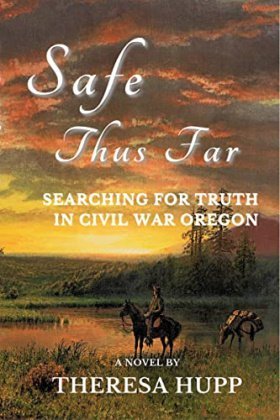They camped in the open again on their second night out, risking a bigger fire because they couldn’t see any human habitation nearby. Their supper was meager, and in the morning, Will ate the last of the food he’d brought. “What do you have left?” he asked Jonah.
“Only enough for our noon meal,” Jonah said. “I best hunt for a rabbit or bird to shoot now. Game’s more apt to be out in the early mornin.’ You stay with the horses.”
Jonah crept away from their fire, leaving Will alone. Tall evergreens loomed overhead, with the rising sun barely shimmering through the pine boughs. His stomach growled, wanting more than the one biscuit and slice of bacon he’d eaten for breakfast. He hoped Jonah would return soon.
While Jonah was gone, Will wrote:
May 1, 1864. Made another 20 miles or so yesterday. Now past Salem. Weather is warm. Jonah hunting.
A shot rang out through the woods. Soon Jonah came crashing back. “Got a duck,” he said. “She was on a nest, and I got her eggs, too. Six of ’em.”
“Where’s your pan?” Will asked, ready to cook the eggs.
“Pan?” Jonah said, sounding chagrined. “I ain’t got one. I ain’t thought of that.”
Will shrugged. He’d seen eggs cooked in their shells, and he’d try that in the coals. He went about the task while Jonah dressed the bird.
When he tapped the shells off the eggs, they were solid—too solid with half-formed embryos inside. He didn’t relish eating the embryos, but he swallowed down his portion anyway.
“Duck for dinner,” Jonah crowed, holding up the plucked and gutted carcass of the bird. “We’ll feast tonight.”
They rode south all day, again keeping the Willamette visible on their right. The forests grew denser, and the trail moved closer to the river. As they approached the water, however, the land grew marshy and difficult for the horses to walk.
“Ain’t there a road in these parts?” Jonah complained.
“There should be,” Will said. “We passed Albany earlier. I saw it off to the west. But I haven’t seen any sign of Corvallis yet.”
They rode on until Will spotted buildings on the far side of the Willamette. “There it is—there’s Corvallis.”
“How’d you know it’s Corvallis?” Jonah asked.
“I’ve been there,” Will said.
“Your pa brung you this far south?” Jonah seemed skeptical.
“I told you—we took the steamboat to Eugene.” Will pointed. “See beyond the town? There’s another river joining the Willamette. That’s Mary’s River. That’s how I know it’s Corvallis.” He sighed. “Next big town is Eugene. Beyond that, I won’t know any more than you do.”
“How far to Eugene?” Jonah asked.
Will shrugged. “On the boat it only took a few hours from here. I don’t know how long it’ll take on horseback.”
Jonah sighed. “Wish we had money for the boat. It’d be so much easier.”
They camped on a rise along the east bank of the Willamette not far south of Corvallis. And, as Jonah had promised, they feasted on duck. “Tastes mighty good, don’t it?” he said, patting his belly.
“It does,” Will said. “But what will we eat tomorrow?”
May 1, 1864, evening. Got past Corvallis. Ate duck tonight.

The boys saved the duck legs for breakfast, but then they were out of food. “Shall I hunt again?” Jonah asked.
Will shook his head. “Maybe this evening. Or if we come across a town, I can buy flour and we’ll make biscuits.”
Jonah guffawed. “How we gonna make biscuits without a pan?” he asked.
Will chuckled, too. “I guess we need more practice in running away.”
By afternoon, their predicament didn’t seem so amusing. Will was famished—hungrier than he’d ever been, despite the duck leg he ate that morning. “We should be about halfway to Jacksonville,” Jonah said, sighing. “Joel told me it was a ten-day ride from Esther’s house.”
“That can’t be right,” Will argued. “We aren’t even to Eugene yet.”
The boys bickered, but neither of them had a basis for resolving the dispute.
That night, after they found a campsite, Jonah set out to hunt. Again, Will noted their progress in his journal:
May 2, 1864. We haven’t reached Eugene, and we’re out of food. Hope Jonah can shoot another duck.

























